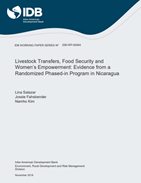Livestock Transfers, Food Security and Women’s Empowerment: Evidence from a Randomized Phased-in Program in Nicaragua
Date issued
Nov 2018
Subject
Gender Equality;
Food Security;
Impact Evaluation;
Women’s Empowerment;
Livestock
JEL code
O13 - Agriculture • Natural Resources • Energy • Environment • Other Primary Products;
Q12 - Micro Analysis of Farm Firms, Farm Households, and Farm Input Markets;
O12 - Microeconomic Analyses of Economic Development;
Q18 - Agricultural Policy • Food Policy;
D13 - Household Production and Intrahousehold Allocation
Country
Nicaragua
Category
Working Papers
This paper explores the impact of a livestock transfer program, that targeted small-holder female farmers with high levels of food insecurity in Nicaragua. For this purpose, the three dimensions of food security are assessed (i.e. access, availability and food use). The analysis uses a double difference estimation combined with a propensity score matching to capture the effects of program participation on a sample of 1200 farmers, representative of treatment and control groups. Also, taking advantage of a randomized phased-in, the findings are tested for a smaller sample of beneficiary farmers. The results confirm that program participation improve households’ food security through higher income from livestock sales and home consumption from own production (i.e. access and availability). Also, some evidence is found that food use is also improved by greater protein intake. Moreover, positive impacts on women’s empowerment and gender parity within the household are found, mainly driven by higher level of associativity.
Generative AI enabled




